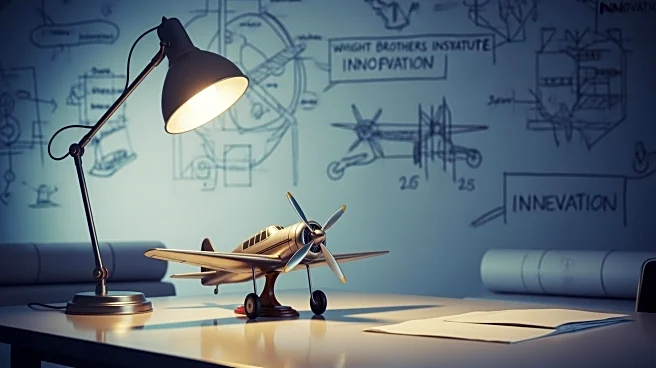What's Happening?
The Wright Brothers Institute, a key player in fostering innovation in the Dayton region, has announced the suspension of its operations after more than two decades. Established in 2002, the institute
was a collaborative effort between the Dayton Development Coalition, the University of Dayton, and Wright State University. Its mission was to connect the U.S. Air Force Research Laboratory with the local community and enhance the region's reputation as an innovation hub. Over the years, the institute completed over 1,000 projects, addressing Air Force challenges and developing rapid prototyping methods like 'Skunk Works.' Despite its achievements, the institute's board has decided to suspend operations, citing a reduced need for a separate organization to carry out its initiatives. The board plans to revisit the corporation's future in early 2026, while other organizations will assume some of its activities.
Why It's Important?
The suspension of the Wright Brothers Institute's operations marks a significant shift in the Dayton region's innovation landscape. The institute played a crucial role in bridging the gap between the Air Force and local entrepreneurs, fostering technological advancements and workforce development. Its closure could impact the region's ability to maintain its status as an innovation powerhouse, potentially slowing down the pace of technological competition and development. The decision to suspend operations may also affect local universities and businesses that relied on the institute for collaboration and support. However, the institute's legacy and the respect associated with its name may provide opportunities for future initiatives, ensuring that its impact on regional innovation continues in some form.
What's Next?
The board of the Wright Brothers Institute plans to revisit the corporation's future in early 2026, leaving open the possibility of reactivating the organization if new opportunities arise. In the meantime, other organizations will take over some of the institute's activities, ensuring that its mission to support innovation and technological advancement in the Dayton region continues. Stakeholders, including the Dayton Development Coalition and local universities, may explore new partnerships and strategies to fill the void left by the institute's suspension. The decision will likely prompt discussions on how best to sustain the region's innovation ecosystem and maintain its competitive edge in technological development.
Beyond the Headlines
The suspension of the Wright Brothers Institute raises broader questions about the sustainability of innovation-driven partnerships between government entities and local communities. As technological competition intensifies globally, regions like Dayton must adapt to changing dynamics and find new ways to engage with nontraditional technology partners. The institute's closure may serve as a catalyst for rethinking how innovation is fostered and supported at the regional level, potentially leading to new models of collaboration and engagement. Additionally, the decision highlights the challenges faced by organizations in maintaining relevance and impact in rapidly evolving technological landscapes.











